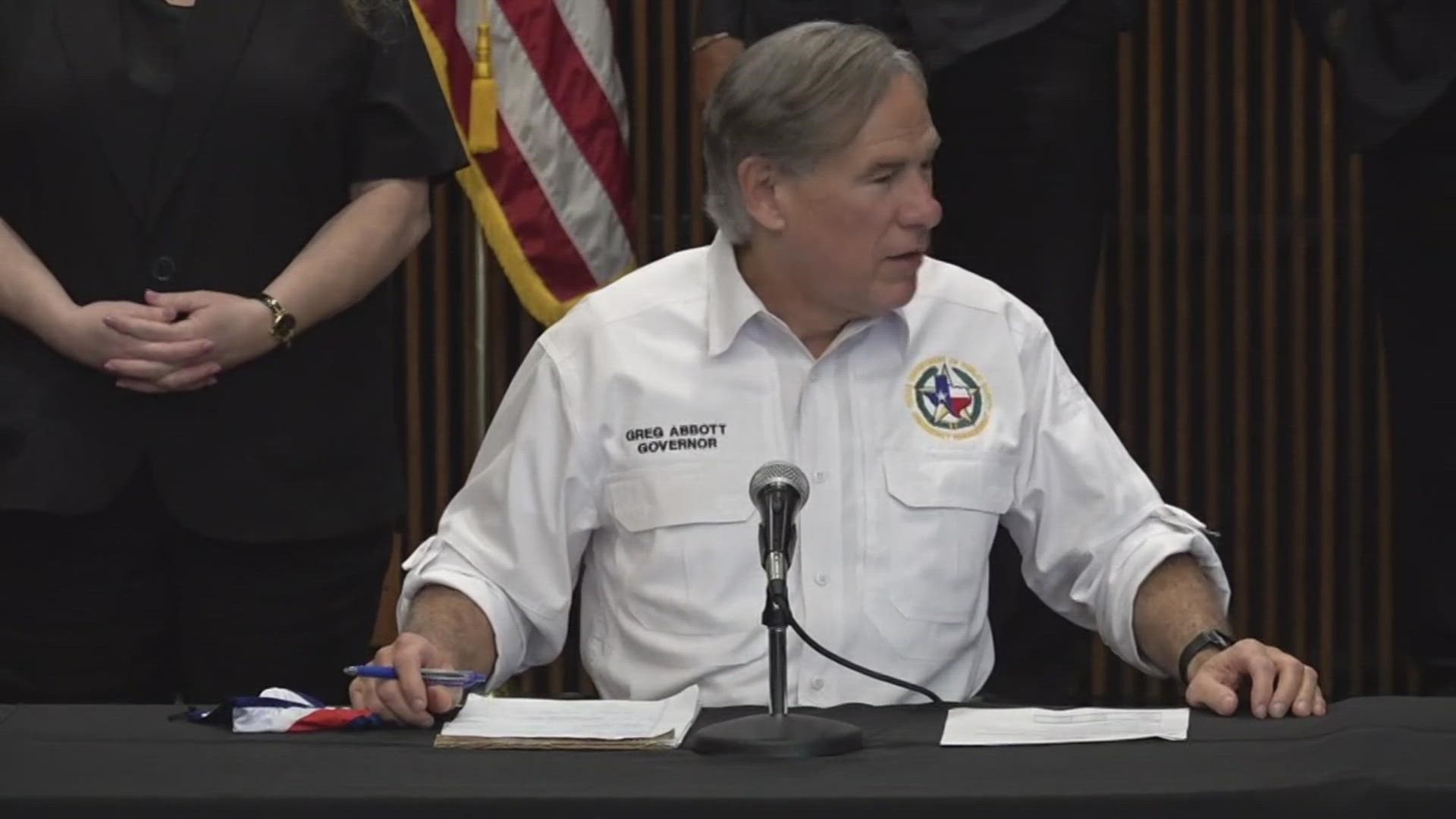BEAUMONT, Texas — Texas Governor Greg Abbott held a press conference Tuesday in Beaumont to provide an update on the COVID-19 response in Southeast Texas.
Gov. Abbott held briefings with Southeast Texas officials to provide an update on distribution of personal protective equipment and strategies to help reduce COVID-19 in the region.
"The numbers are moving in the right direction, but it is fair to say that hospital capacity by those who are positive for COVID-19 still remains too high," Gov. Abbott said.
The governor mentioned that the best way to reduce hospitalizations is to reduce the number of people who test positive before urging those applicable in the region to donate plasma.
"I was very impressed to learn some of the strategies that were being used in this region to reduce fatalities, to heal patients faster and get them out of the hospital room," Gov. Abbott said. "I was particularly impressed by the use of blood plasma in the region. It’s so important for everybody to understand this because everybody who has tested positive for COVID-19 who has recovered- which is a very large number, both in Jefferson County, Orange County as well as the state of Texas- everybody who has tested positive for COVID-19, who has recovered, they have blood plasma that can help others over come the challenge of COVID-19. Many of those people have already been treated here in Jefferson County."
The Governor also listed best practices for Southeast Texans that can help reduce the spread of COVID-19.
"The only way to reduce the spread is by everyone continuing to do the best practices of wearing a mask, keeping a distance from others, staying home, if at all possible, using frequent hand sanitizing to make sure that you are reducing the spread of COVID-19," Gov. Abbott said.
At least five more schools have already went back to school this week in Southeast Texas, and some are still in the planning stages of returning. The Governor reiterated that he's leaving the discretion up to school districts regarding reopening. "Whatever is the best determined strategy by a school district, is exactly the pathway that school district will follow," Gov. Abbott said.
In addition to best practices, the Governor said he was working with Chief Nim Kidd with the Texas Division of Emergency Management to ensure schools have the tools and PPE supplies necessary to open up safely.
"That includes masks, hand sanitizing materials," Gov. Abbott said. "Already distributed to ISDs in Jefferson County are about 150,000 masks...more than 4,000 gallons of hand sanitizer and over all, the state of Texas has shipped more than 755,000 masks to Jefferson County, more than 62,000 gallons, more than 118,00 gloves, more than 2,000 face shields, and we will continue to provide whatever PPE is needed."
During the conference, protesters were outside of city hall with signs regarding the reopening of breweries, wineries and bars. The governor acknowledged the concerns of those types of establishments being closed along with other businesses that are closed due to COVID-19. He also mentioned why slowing the spread would require "extra vigilance" from bar owners.
"The fact of the matter is, the way that bars are structured, they’re structured for people to come together, close together without face masks in situations where people frequently become intoxicated and when they become intoxicated, they lose the discipline that they need to maintain the practices to prevent the spread of COVID-19," Gov. Abbott said.
The Governor was joined by Texas Division of Emergency Management Chief Nim Kidd, Beaumont Mayor Becky Ames, Jefferson County Judge Jeff Branick, and Orange County Judge John Gothia.
GET NEWS & WEATHER ALERTS | Download the 12News App to your mobile device
Coronavirus symptoms
The symptoms of coronavirus can be similar to the flu or a bad cold. Symptoms include a fever, cough and shortness of breath, according to the Centers for Disease Control.
Most healthy people will have mild symptoms. A study of more than 72,000 patients by the Centers for Disease Control in China showed 80 percent of the cases there were mild.
But infections can cause pneumonia, severe acute respiratory syndrome, kidney failure and even death, according to the World Health Organization. Older people with underlying health conditions are most at risk.
The CDC believes symptoms may appear anywhere from two to 14 days after being exposed.
Human coronaviruses are usually spread through...
- The air by coughing or sneezing
- Close personal contact, such as touching or shaking hands
- Touching an object or surface with the virus on it, then touching your mouth, nose or eyes before washing your hands.
Help stop the spread of coronavirus
- Stay home when you are sick.
- Eat and sleep separately from your family members
- Use different utensils and dishes
- Cover your cough or sneeze with your arm, not your hand.
- If you use a tissue, throw it in the trash
Lower your risk
- Wash your hands often with soap and water for at least 20 seconds. If soap and water are not available, use an alcohol-based hand sanitizer.
- Avoid touching your eyes, nose, and mouth with unwashed hands.
- Avoid close contact with people who are sick.
- Clean and disinfect frequently touched objects and surfaces.
- If you are 60 or over and have an underlying health condition such as cardiovascular disease, diabetes or respiratory illnesses like asthma or COPD, the World Health Organization advises you to try to avoid crowds or places where you might interact with people who are sick.


